And with the world becoming more and more chaotic, life will become more challenging for everyone. Singles will feel those challenges more poignantly. It’s one thing to have a companion to share your burdens and support you. It’s quite another when you don’t. To all my single LDS friends, here’s all the more reason why you need to shore up your spiritual foundation by including the temple more in your life. Strengthen your spiritual foundation President Nelson began his remarks by sharing some progress made in strengthening the foundation of the Salt Lake Temple. I love how he draws a ready metaphor for establishing a foundation for our own spiritual lives. To that I would add the need for each of us to establish a solid foundation in every part of our lives: the emotional/social, the mental/intellectual, and the physical. But clearly the spiritual foundation is the most important. The spiritual aspect of life contains the beliefs, values, and ethics that drive behavior in every other life aspect. We need to ensure the spiritual area of life is firmly founded. President Nelson understood as much when, speaking of the Salt Lake Temple, he shared
President Nelson then shared the perfect place to build that solid spiritual foundation we all need — inside the temple. In reality, it’s living inside temple covenants that lays the actual bricks of our spiritual foundation. But all of that comes together in the temple. President Nelson taught
Look to the temple All the blessings LDS singles look to receive are connected with the temple. Indeed, many of these blessings are the same blessings Abraham, Isaac, and Jacob sought and obtained — blessings available to all who make and keep the sacred covenants available only in the House of the Lord. Those blessings came to those early fathers not all at once but incrementally. Likewise, the blessings LDS singles seek to obtain in their lives will not come all at once but “here a little, and there a little” (Isaiah 28:10). President Nelson extended that idea to the great blessing of the Restoration:
If something as important to our Heavenly Father’s plan as the Restoration is still ongoing, His plan for each of us is surely ongoing as well. That thought prompts patience in LDS singles who yearn to have desired blessings now. Embrace faith over fear 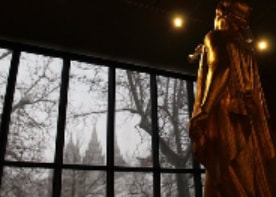 Including the temple at the center of our spiritual foundation can provide the faith needed to choose not only patience but also perseverance. Within the temple we learn of Christ and His Atonement, our Heavenly Father’s plan, and the connections He intends to forge across generations of the human family. The temple also helps us navigate the road of life to as yet unrealized blessings. As chaos in the world grows, we can have the peace that surpasses all understanding, a quiet confidence God will support us when we feel all is lost. The temple and living inside the covenants made there can fill us with that faith. That faith can help us resist fear. President Nelson counseled,
How many LDS singles live in fear the blessings they desire will not come to them? The temple and temple covenants provide the solid spiritual foundation from which we can each take needed action in the other aspects of our lives. We can trust Christ and His power to change us so we can more easily receive the blessings we seek. So include the temple more in your spiritual foundation. The unprecedented times President Nelson foresees will call for unprecedented measures in the attention we give to our foundation and the renewal we provide daily to it. In so doing, we can live with greater confidence and optimism as our fears become memories of a distant past. And that will bring us more joy in our journey.
0 Comments
But I also had a conversation with my PhD advisor, who wants to see much more out of me. That experience led me to reflect on what I have in my life and more importantly why. Reassessing the different elements in my life somehow brought me to President Nelson’s remarks from the last General Conference entitled “Make Time for the Lord.” In this address, President Nelson shared three ways in which we can make time for the Lord. Focus on the Savior  The first time we should make for the Lord is to fix our focus on Christ. President Nelson declared, “Nothing invites the Spirit more than fixing your focus on Jesus Christ. Talk of Christ, rejoice in Christ, feast upon the words of Christ, and press forward with steadfastness in Christ.” In my recent reflections, I’ve wondered how much of my focus is fixed on Christ. How often do I talk of Him? How often do I rejoice in Him? How often do I feast upon His words? How often do I feel the determination to press forward with steadfastness in Him? I’ve focused my scripture study this year on success and the path to prosperity. My study hasn’t yet concluded, but it’s already abundantly clear lasting prosperity comes as God’s blessing upon those who embrace true principles. This conclusion encourages us to follow the Prophet’s counsel to fix our focus on Christ. Later this month I’ll pivot my scripture study towards my annual tradition of studying the Sermon on the Mount to increase my discipleship. I’ve discussed this practice before on the program, and I expect it once more to increase the fixation of my focus on Christ. All are welcome to join me, but whether or not you do, find some way increase your focus on the Savior. Delight in the Sabbath  The second time President Nelson encouraged us to make for the Lord is to delight in the Sabbath day. He taught, “Make your Sabbath a delight as you worship Him, partake of the sacrament, and keep His day holy.” Consider that teaching. The Sabbath is a delight when we make it one. How do you make your Sabbaths feel delightful? Do they feel delightful to you? You can use that question to gauge how well you keep the Sabbath. The more delightful the Sabbath feels to you, the better you keep the day. And no matter how delightful the Sabbath feels to you, there’s always another level you can reach. Obviously you can feel more delight in your Sabbath if you don’t feel any. But if you do feel delight in your Sabbath, you can feel more. So the question is this: Are your Sabbath day activities what they should be? Or do you need to change something? Connect with the temple  The third time the Prophet pleaded us to make for the Lord concerns temples. President Nelson taught, “Please make time for the Lord in His holy house. Nothing will strengthen your spiritual foundation like temple service and temple worship.” Because my nearest temple has yet to reopen, I currently need to travel some distance to attend the temple. And so I’ve been meaning to get more into family history work in preparation for when my temple reopens. I say meaning to because I’ve done nothing more than occasionally dabble. Clearly the Prophet is calling me to repentance. And with that call comes an invitation to extend the Prophet’s admonition to every area of life. With all my responsibilities and everything in my life, am I making enough time for the Lord? We could each ask ourselves that question. If you haven’t considered it lately, I invite you to make time to consider it. In the end, if you haven’t made time for Christ, it won’t matter what you made time for. So make time for the Lord. When we make the time to consider what time we are making for what matters most, we can more easily connect with what matters most. In that way we can establish a better balance in life. And that will bring us more joy in our journey.
But I really wasn’t capturing the full depth of those words. Maybe I needed some time and distance as well as some more experience with the world to appreciate what he gave all of us. Indeed, you could say that’s one thing I’m learning. And after the program today, perhaps we all can say it’s one among many of what we are learning. Home-centered worship  Addressing the global pandemic, President Nelson shared four lessons he hoped we’ve all learned and won’t forget. I sense a greater sense of optimism in his words now than I did six months ago. That optimism increases my appreciation for his first lesson: The home is the center of faith and worship. I think most of us recognized the prophetic nature of the 2018 announcement regarding home-centered church. But I’m not sure that was true before COVID hit. I certainly didn’t recognize the significance of some of my pre-COVID promptings. For instance, shortly before the first lockdown I felt impressed to purchase white tablecloths. What do I need white table cloths for? I thought to myself. When am I ever going to use a white tablecloth? I found out soon enough. What a blessed privilege was mine to partake of bread and water in memory of my Lord and in my own home! I truly felt closer to my Heavenly Father in those moments than I had in any worship service in a chapel. In response to such an experience, President Nelson asked,
Considering what we need to do to increase the security and serenity of our own homes would be time well spent. Needing each other  President Nelson’s second and third lessons, that we need each other and your priesthood quorum is more than just a meeting, seem especially intertwined. We really do have a unique opportunity to leverage the present pandemic to unify God’s children like the world has never before seen. But that will become reality only if, as President Nelson asked, our shared trial has drawn us closer to one another. These days it seems the pandemic is driving us farther apart. But if that’s true, it’s because we’ve forgotten the two commandments President Nelson declared could guide us — first, to love God, and second, to love our neighbor. I especially love President Nelson’s teaching that
Flip that around, and see the profundity of the Prophet’s teaching. Why has God sent us to earth in families and wards and stakes? He wants us to work together and help each other. Why has He asked us to serve and minister to each other? He wants us to work together and help each other. Why has He asked us to live in but not be of the world? He wants us to work together and help each other. One could apply that answer to this question: Why has God organized priesthood holders into quorums? Priesthood is indeed more than a church meeting. Hearing the Savior 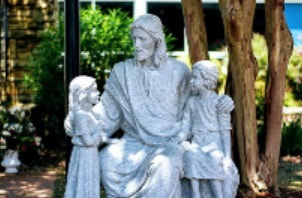 President Nelson’s final lesson from the pandemic ties the others together. The home is the center of faith and worship. We need each other. Your priesthood quorum is more than just a meeting. And we hear Jesus Christ better when we are still. As I just mentioned, the pandemic seems to be driving us further apart. We seem more agitated and contentious than ever. President Nelson confirmed we’re living in prophesied days of commotion and fear. He didn’t declare that commotion would be temporary. Rather, it’ll increase. But we need not be in commotion. If we can be still, we can hear the Savior’s voice speaking peace and confidence to us. As President Nelson taught,
Making time for quiet reflection will become more and more essential as the world becomes more and more contentious. If we will do as the Prophet instructs, we will see the fulfillment of his promise that “the future is bright for God’s covenant-keeping people.” And that will bring us more joy in our journey.
As is characteristic of the prophets we've seen thus far in the 21st century, President Nelson spoke multiple times this past Conference. But one address stood out to me as I considered the focus for the program today. President Nelson's address entitled "Hear Him" focused on the Savior in a way that addresses the craziness which now seems to engulf the world. And in light of recent reflections regarding the Savior and what makes the good we bring to the world truly matter, it is ever more vital that we do indeed hear Him. Hear
That sounds a lot like what he said in his first Conference address as President of the Church.
So it shouldn't surprise us that President Nelson mentioned the Holy Ghost as a way to hear the Savior.
When I think of a place to receive revelation and feel the influence of the Spirit, the temple comes quickly to mind. Although the pandemic has restricted most of us from being in the house of the Lord, President Nelson looked ahead to when they will one day reopen.
"And, finally," President Nelson declared, "we hear Him as we heed the words of prophets, seers, and revelators." With that opportunity just a few days away, I'm glad it won't be long now to hear from our inspired leaders as they point the way to the Savior. Hearken 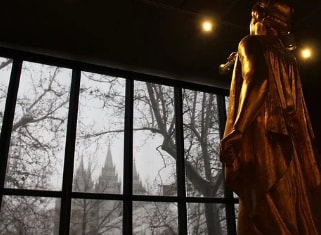 But notice that President Nelson didn't say we hear the Savior as we hear His servants. No, he said we hear the Savior when we heed His servants. To heed means more than just to hear. President Nelson also used the word hearken. He observed that "the very first word in the Doctrine and Covenants is hearken" and then defined hearken to mean "to listen with the intent to obey" before declaring
I like that idea of being more intentional about hearing the Lord. Making conscious choices and acting with intention is key to unlocking much of the joy that surrounds us every day. Our best life comes to us not be accident but by design when act with the intention to have it. Likewise, we hear the Lord more clearly when we act with the intention of hearing it. Listening with that desire to obey whatever we receive is key to having that right and proper intention. Heed  Of course, listening with the desire to obey makes the next step obvious once we actually do hear. We must obey and heed what we have heard. We must apply our newly acquired knowledge. We must act and obtain the results possible only through action. President Nelson was quite clear what some of those results would be.
I don't think I've ever been more eager for Conference to arrive than I am after experiencing what 2020 has offered. And a good portion of that eagerness comes from faith that hearing, hearkening to, and heeding the Lord's voice as spoken through His anointed servants will bring the blessings President Nelson has promised and so much more. And that will bring us more joy in our journey.
Here we find foundational principles local leaders can leverage to help LDS singles find their way. Walk beside singles We all understand others better when we step outside ourselves and view the world through their eyes. That increased understanding can open your eyes to what many LDS singles need — true friendship. My last ward was absolutely awful. Usually no one talked to me or even greeted me. They didn’t seem at all interested in having me there. So when the storms of life beat against my door, no one was there to support me. I felt not just alone and unloved but spiritually stinted, like I was trapped in a sort of prison. What a nightmare! If nothing else, that experience makes me very thankful for my current ward. Ward members greet me, shake my hand, and sincerely ask after my well-being. They’ve responded when I needed help and support. I feel the warmth of their simple love and sincere friendship. What a blessing! It doesn’t take much to help LDS singles feel loved and supported. When local leaders — whether married or single — walk beside singles in true friendship, those simple acts can readily meet many needs. Shore up faith  True friends always increase faith in others. Our Heavenly Father wants LDS singles to marry in the temple and raise righteous families who will promote His work on the earth. That won’t happen if singles don’t believe it will. Local leaders can portray faith and confidence in singles’ ability to achieve a righteous marriage. How are LDS singles supposed to believe those blessings can be theirs when leaders respond quickly with trite expressions like “Well, it’s OK because there’s always the next life.” That’s true, but have you stopped to consider what living that really means? You’re saying it’s OK the experience singles have already had being single continue for another 40 or 50 years, and then they die, and then sometime after that they get their blessing. That’s not a very enticing prospect, even if it is true. It’s far more enticing to fix one’s sights on examples like Abraham. His promised covenant child came when Abraham and Sarah were both around a century old. Or how about Jacob’s wife Rachel, who for the longest time was barren? I love Genesis 30:22 — “And God remembered Rachel ....” Local leaders who shore up singles’ faith in themselves and their ability to achieve eternal blessings now and not just in the next life provide greatly needed support. Promote the next essential ordinance Of course, securing that next essential ordinance of temple marriage takes more than belief or a motivational pep talk. The lives of many LDS singles stagnant in a lack of accountability. Local leaders are well positioned to provide that accountability. Life has a way of beating us all into routines. We are, after all, hardwired to have habits. That can be helpful but also dangerous, especially if we’re lulled away from progressing towards eternal goals. The longer singles remain single, the more comfortable they can become being single. And with that comes less likelihood they’ll progress towards their next essential ordinance. Local leaders can stem that tide of indolence with some gentle accountability. If they’ve paid the price to be a true friend, local leaders — and in particular ministering brothers and sisters — can guide singles towards their next essential ordinance with effective questions. “What’s in your way?” is a good example. As they repeatedly ask questions, simply listen, and then stand ready to help as requested, local leaders extend accountability for progression as singles decide for themselves how they will progress. When they support singles by being a true friend, local leaders can minister more effectively to LDS singles. That will increase the love we all have for one another. That will build bridges of understanding between marrieds and singles. That will develop a stronger unity of the faith. And that will bring us more joy in our journey.
In the most recent General Conference, Elder Jack Gerard of the Seventy spoke of the importance of priorities in life. His remarks, entitled “Now Is The Time,” encourage all of us to place our priorities upon what matters most in life — our relationship with our Heavenly Father and His Son Jesus Christ. Whether or not you have goals for the new year, now is the time to consider whether the priorities you really do have are the ones you really should have. Set the right priorities  Elder Gerard begins with an account of chest pains he experienced while traveling. After arriving at the airport, he sought help at a local hospital, wondering if he would reach his final destination. A doctor ran multiple tests and then declared him safe to continue his travels. Elder Gerard returned to the airport and resumed his journey. As the plane approached his final destination, Elder Gerard learned an ambulance would be waiting to take him to the hospital. The doctor had misdiagnosed his condition, which was much more serious than previously supposed. After he learned the new diagnosis and that not many patients survive that condition, Elder Gerard’s perspective suddenly shifted. He described his experience with these words:
Indeed, now is the time to consider our direction. Stephen Covey often used the analogy of a ladder when speaking about priorities. He described a man who exerted much effort to climb a ladder leaning against a wall. When he got to the top, what he saw behind the wall made one truth painfully obvious; his ladder was leaning against the wrong wall. It should sound silly to talk about priorities after many of us have made our goals, because priorities rightfully come before goals. We need to establish our direction before we establish what we want to accomplish. Otherwise, we’ll likely find the ladder we climb has been leaning against the wrong wall. Be intentional  Daily life in our modern world contains so many distractions we can spend our lives wandering aimlessly without any sense of direction or purpose. We need to take time to reflect upon our direction. Unless we do, we’ll easily become “like a wave of the sea, driven with the wind and tossed” (James 1:6). Do the things of greatest eternal importance have the highest priority in your life? If not, it’s never too late to start again. Now is the time to consider your direction. Elder Gerard reminds us that
It’s so easy to coast and let the waves of day-to-day living just wash over us! But that complacency will never deliver your best life. You get your best life by living intentionally, and living with intention requires awareness of what you’re doing and more importantly why. That means having priorities and a plan of action that supports those priorities. How else do we ensure our ladder is not leaning against the wrong wall? Priorities determine direction, and direction determines destination. Rise above distraction  During his remarks, Elder Gerard asked this very practical question: “How do we rise above the distractions of this world and stay fixed on the vision of eternity before us?” He then extolled Christ as the standard by which to judge what’s best and declared “understanding our divine origins is essential to our eternal progress and can free us from the distractions of this life.” Ultimately, the best way to know what our real priorities should be is to evaluate ourselves and our lives without distraction. That’s where temple attendance can be so refreshing. In the house of the Lord, we can separate ourselves from the distractions of the world. Remembering our divine origins and why we’re here can bring clarity to an otherwise muddled view. If you wonder whether your ladder is leaning against the wrong wall, now is the time to consider what changes you need to make. If you didn’t make any goals for the new year, then by default you decided to let the waves of life carry you where they may. Now is the time for you to own your life and establish the priorities that will determine your direction and ultimately your destination. When you do, you’ll find yourself moving forward more confidently. And that will bring you more joy in your journey.
Because it’s always good to know what the living Prophet said in the last Conference, my selection wasn’t difficult to make. In “Revelation for the Church, Revelation for Our Lives,” President Russell M. Nelson spoke of our increasing need to include personal revelation in our lives. And he did so by sharing experiences with revelation from his own life. Said he,
Later he revealed (pun intended) how we can best receive that revelation in our lives.
We all have questions that can be answered and challenges that can be solved with the divine inspiration that comes from revelation. But do we have the power-packed combination President Nelson offered? Pure and obedient  Increased purity and exact obedience go hand in hand. You can’t have one without the other. We increase our purity only by aligning ourselves more closely to standards of truth, and that means obeying the commandments with more exactness. I remember on my mission we were constantly encouraged to be “Ammon missionaries.” Ammon performed every command given him (Alma 18:10) and as a result had wonderful missionary opportunities open to him. Years later, many of the sons of the converts Ammon taught went to battle under Helaman’s command. Mormon ascribes their miraculous preservation in battle to their faith, which they had because “they did obey and observe to perform every word of command with exactness” (Alma 57:21). How exact are we in our obedience? Are we unable to receive the revelation we need to do wonderful things because our tolerance for impurity is too low? Are we kept from our best life solely by the essential bits of information we might have received had we been more committed? Seeking and feasting  Just as purity and obedience go hand in hand, so too do earnest seeking and feasting daily from the Book of Mormon. Earnest seekers of answers to questions and solutions to challenges will look to hear God’s voice through many channels. And an obvious channel is the scriptures. And in no book of scripture can we hear the voice of heaven more clearly than in the Book of Mormon. This book was prepared for us in our day. The ancient prophet Alma the Younger instructed his son Helaman that the Lord was preparing the plates from which the Book of Mormon was later translated “that he may show forth his power unto future generations” (Alma 37:14). I believe part of that “power” is an increased capacity to hear the voice of God provide answers to our questions and solutions to our challenges. Of course, we don’t always get answers and solutions just for the asking. Some times we’re left to struggle with our questions and challenges because that struggle will help us to grow in a way we other wouldn’t if we received everything on demand. But, as President Nelson promises,
Certainly these blessings come after we do our part. So how are we doing? Are we earnestly seeking for answers while feasting every day in the Book of Mormon? Committed to temple and family history work  The final part of President Nelson’s power-packed combination is like icing on a cake. Temples are natural places of revelation, and the family history work that supports temple work naturally invites revelation. Both provide ways for us to practice the increased receptivity to revelation gained from increased purity, exact obedience, earnest seeking, and daily feasting in the Book of Mormon. I confess that lately I’ve been slacking here. There’s no reason why I can’t attend the temple weekly. In fact, I’ve never before had so little excuse not to attend weekly as I live conveniently to two temples. But like most things in life, if you don’t schedule the time to go and then commit to follow that schedule, life can easily crowd out family history and temple service. That’s why I like President Nelson’s description: “regular time committed.” We need to establish a time when we will go to the temple and when we will participate in some aspect of family history work. And then we need to commit ourselves to follow through on our plans. What questions do you need answered? What challenges do you need solved? Revelation can help. When we follow President Nelson’s counsel, that blessing can be ours. And that will bring us more joy in our journey.
I have a love-hate relationship with RootsTech. I love the energy and excitement which RootsTech generates for family history work. But you can’t really talk about family history work without telling stories about ancestors who did this wonderful thing or left that inspiring heritage. And hearing those stories makes me bawl like a baby every time. Yeah, that’s right. Every time. Stories connect us to our ancestors and help us discover who we are. Truly our hearts turn towards our fathers when we discover, gather, and share stories of our ancestors with the generations after us. That turning of the children’s hearts aligns very well with our innate yearning for our heavenly home. And that provides for a contribution we need to make. What will you leave? 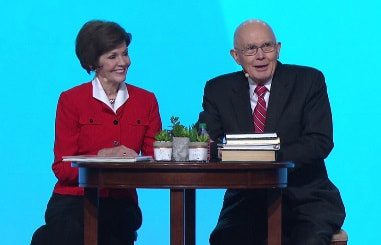 When I learned that Family Discovery Day at RootsTech 2018 would feature President Oakes, I could hardly contain my excitement. Here we have the General Authority who’s perhaps more closely identified with LDS singles life and issues than any other General Authority. Of course the presentation was outstanding. President and Sister Oakes told stories, and I broke yet another water main. But they also touched on a theme similar to Elder Uctdorf. The Oakeses emphasized the need not just to provide ordinances for our ancestors but also to retell the stories about those ancestors continuously for the benefit of future generations. And they brought examples. President Oakes showed copies of journals from some of his ancestors and told how sharing those journals have benefitted his descendants. Sister Oakes described how the journals of her ancestors gave her a wonderful religious education. The testimonies they bore of the restored gospel taught her much. It made me wonder, “What stories am I leaving for the generations that come after me?” You don’t need to be married to leave a strong testimony or inspire a wonderful heritage of faith and courage. But future generations will never know it unless someone records it. Who will you follow? 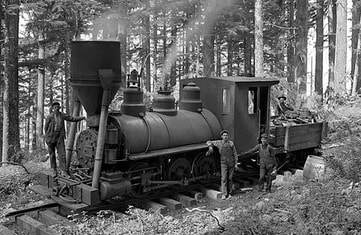 Hearing the stories of our ancestors stirs a longing inside of us. We yearn to be united with those we love who have passed on before us. Yet the same Spirit which prompts us to turn our hearts towards our fathers also invites us to follow the Savior and return to our heavenly home. Elder Uchtdorf spoke of how God knows each one of us intimately — “your every thought, your sorrows, and your greatest hopes.” He also declared that following the Lord on the path back to our heavenly home will make our lives better. Said he,
Is there any better way to follow the Savior than participating in family history and temple work? Surely the fruits of the Spirit will be ours when we contribute to this wonderful work. And LDS singles can make very meaningful contributions. What will you contribute?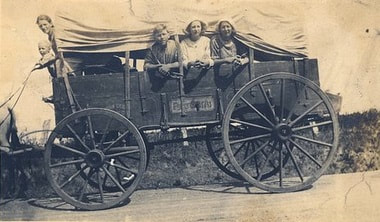 Those who embrace this cause on their journey home will reach a wonderful realization. Elder Uchtdorf declared this life isn’t about just you or me but all of us. We all feel the yearning to come home, and that puts all of us on the same journey back to that heavenly home. President and Sister Oakes shared similar principles in their RootsTech presentation. We must be linked together with our ancestors because we cannot be saved without them, nor can they be saved without us. If such grandiose visions make you question what role you could possibly have in such a cause, consider Elder Uchtdorf’s remarks when he offered these thoughts:
Family history and temple work isn’t just for old people. And I don’t care how much pioneer ancestry you have; there’s work for you to do! We singles can make mighty, meaningful contributions to advancing this work. We can discover, gather, and share the stories of our ancestors in ways that will inspire those who come after us — whether or not they are our literal descendants. As Elder Uchtdorf testified,
Let us each move forward and embrace our own contribution to the cause. When we do, we’ll work miracles in the lives of others. And that will bring more joy in our journey.
 Over the years, I’ve thought about Mormon’s description of the Nephite people in Alma 50:23: “But behold there never was a happier time among the people of Nephi, since the days of Nephi, than in the days of Moroni, yea, even at this time, in the twenty and first year of the reign of the judges.” More recently, I’ve pondered upon these questions:
It’s no surprise to learn Mormon picks this time out of the roughly 1000-year history of his people. His descriptions of Captain Moroni reveal Mormon as a huge fan of the young commander. Giving his son the same name, Mormon likely admired him as a sort of mentor, since they both held the same military position. But is Mormon really picking this time as the happiest among the entire Nephite history because this is when their equivalent to Captain America had his adventures in mortality? Again, what was it about this time that made it the happiest? Let’s examine that. Preparing for war  The year 69 AD saw the Nephite nation living under the threat of war. Just two years previous, Amalickiah was defeated after gaining the Lamanite throne by deceit and waging an unsuccessful military campaign to subjugate the Nephites. Captain Moroni spent the following year preparing his nation for war. He knew Amalickiah would return, and he wanted his people to be ready. They built new, fortified cities as well as fortified those cities already in existence. Those preparations continued on into the next year, the time when “there never was a happier time.” We don’t know much else about that year. The people were busy preparing for war. How does preparing for war create the happiest time ever? Mormon’s commentary may provide a clue. He gets sidetracked talking about how Nephite history has verified the Lord’s promises. Troubles always came to the people when they forgot God and abandoned their covenants. On the other hand, those who remembered their covenants were always delivered. Immediately after this observation, Mormon comments that this time was the happiest ever since the days of Nephi. Could this observation have something to do with creating that happy situation? Remembering the founder 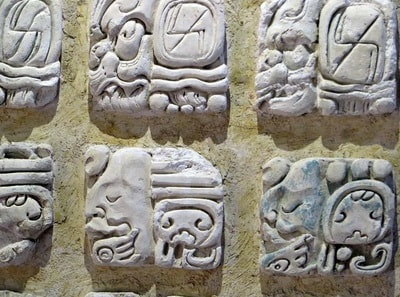 Nephi himself described his people in his day living “after the manner of happiness” (2 Nephi 5:27). What exactly does that mean? Nephi had separated himself from his older brothers because they sought to kill him. Nephi didn’t leave alone; he took with him “those who believed in the warnings and the revelations of God” (2 Nephi 5:6). In other words, Nephi left with those who wanted to make and keep sacred covenants with God. And what did they do once they established their separate community? Nephi’s words explain it all:
Here Nephi describes two main activities:
We see the same activities among the Nephites in 69 AD. They were certainly industrious as they built new cities and fortified existing ones. And Mormon’s commentary suggests they were probably turning to the Lord. Why else would he have thought to insert that commentary? Taking a lesson  What lesson here can LDS singles apply to their lives? Even though they lived under the threat of war, the Nephites were happiest when they were mindful about keeping their covenants with the Lord and industrious in meeting their temporal needs. LDS singles can follow that example. We singles may lack the covenant of marriage in our lives, but we’ve made other covenants at baptism and in the temple. Holding fast to those covenants we have made can provide strength to endure well the challenges of our lives. Temple service in particular can provide perspective to see the opportunity amidst the obstacles. Nephi mentioned having a temple, and I’m sure it wasn’t just for decoration. We singles should do what we can to include the temple more in our own lives. We singles can also be industrious in meeting our temporal needs. This industrious attitude can and should extend to our own personal ministries. God gives each of us gifts so we can contribute to His work. By focusing on utilizing those gifts in our own personal ministry, we bless our own lives by blessing the lives of others. The Nephites lived their happiest time when they filled their days with devotion to the Lord and hard work. We LDS singles can have our happiest time when we follow that example. And that will bring more joy in our journey.
 Last week while discussing Elder Ballard’s most recent Conference address, I spoke about making goals to get married and our need to center our dating efforts on the Savior. Doing that means understanding the fundamentals of dating. One fundamental principle is recognizing the two types of dating. We often confuse ourselves by not making this distinction. We introduce even more confusion in our dating journey when we try to be where we aren’t. Placing too much seriousness too soon in our journey turns us into our own worst obstacle. Being in the place where we are means conforming our actions to where we currently find ourselves. Because there are two types of dating, we should act differently in each respective stage. Committed dating will have more seriousness than casual dating. In fact, when you correctly understand the fundamentals of dating and the two types of dating, you can’t avoid a simple but profound conclusion: Unless the other person is a jerk, a stalker, or a criminal, you should date everyone. You choose your probability of success  The provision against dating a jerk, a stalker, or a criminal makes sense to most. You shouldn’t compromise your personal safety. But the rest of the conclusion to date everyone else will put many LDS singles into a panic. If that’s you, please calm down. This just shows you understand neither the fundamentals of dating nor the nature of casual dating. A casual date is just that — casual. So why make the date serious by putting extensive restrictions on having one? The point of casual dating is to learn more about what you want in a companion so you can narrow down your selections to just one. You’ll then focus on securing the agreement you need to transition to committed dating. That means your probability of success increases as you increase the size of your casual dating pool. You do that when you lower the restrictions on who can enter. That means dating everyone (with the obvious exceptions, of course). Feeling is not knowledge  Many of us want to resist this way of thinking. Some may think I’m advising against having standards while dating. Still others may reject the conclusion because they just “know” So-and-so isn’t right for them. First, you should have standards while dating. Your success, however, will be more likely if you’ll be in the place where you are. Casual dating by its very name suggests a different set of standards than committed dating. You could very well casually date someone who you do not committedly date. In fact, most of us have. Second, I understand the feeling that comes when considering some people as a potential date. It’s like every cell in your body is screaming “NO!” But feeling is not knowledge. You’ll never know unless (1) an angel or other heavenly messenger gives you the knowledge or (2) you get your own experience. I’m thinking the odds for most of us seeing an angel aren’t that great. I love this comment from a married woman named Kathryn.
Such examples abound, showing we really don’t know like we think we do. We should stop pre-judging others and open ourselves to new possibilities. Let experience tell the tale. Like Kathryn, you just might be surprised at what you don’t know. Be in the place where you are  Our LDS subculture has primed us for years to look to temple marriage as a pivotal life moment. And it is. But you’ll never climb the mountain if you constantly stare at the peak without ever looking at the ground directly in front of you. The best way to complete your journey is to look at the ground where you are and occasionally glance at the peak to ensure you’re moving in the right direction. This is the role of feedback we discussed last week in Elder Ballard’s Conference address. Once you know you’re moving in the right direction, be where you are. Whatever stage you’re in, that’s the place where you should be. That means your actions show you’re in casual dating if you’re in that stage of your journey. When you’re ready to move to the next stage of your journey, secure the agreement you need to enter that next stage. Keep focusing on where you are and the very next step you need to take. Your steps will build upon themselves, and eventually you’ll find you’ve climbed the peak. I have yet to find my eternal companion, but I’ve found some wonderful experiences by opening myself to new possibilities when casually dating. I’ve also had more committed dating experiences because I opened myself more in casual dating. Open yourself to new possibilities. You just might be surprised. And you’ll have more joy in your journey.
|
Author
Howdy! I'm Lance, host of Joy in the Journey Radio. I've been blogging about LDS singles life since 2012, and since 2018 I've been producing a weekly Internet radio show and podcast to help LDS singles have more joy in their journey and bring all Latter-day Saints together. Let's engage a conversation that will increase the faith of LDS singles and bring singles and marrieds together in a true unity of the faith.
Comment
Joy in the Journey Radio encourages the free discussion of ideas but reserves the right to remove and/or block comments which do not conform to LDS standards.
Donate
Joy in the Journey Radio offers many free resources to help LDS singles everywhere, but it certainly isn't free! Help Joy in the Journey Radio in its mission to improve the lives of LDS singles by donating today.
Posts by Month
December 2022
Categories
All
|








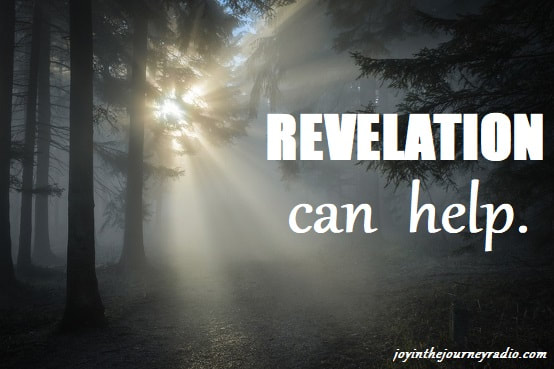
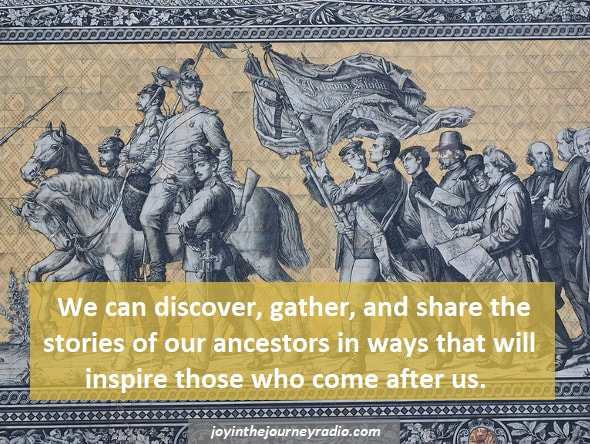
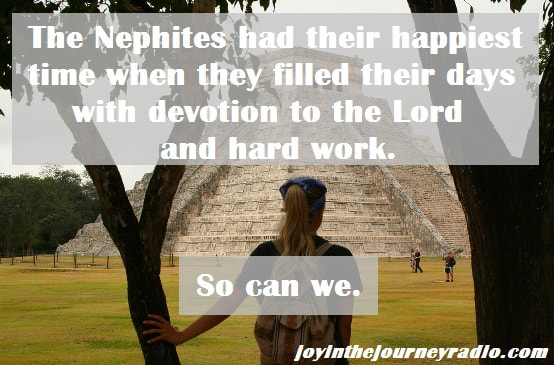

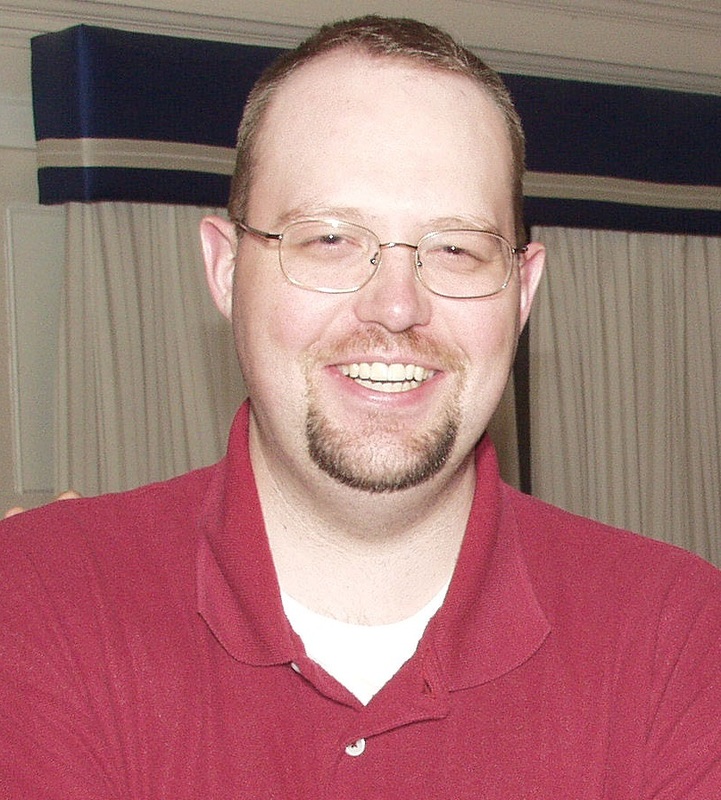
 RSS Feed
RSS Feed